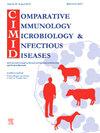Seroprevalence of Leishmania spp. in pigs farms (Sus scrofa domesticus): Epidemiological insights and zoonotic implications
IF 2
3区 农林科学
Q4 IMMUNOLOGY
Comparative Immunology Microbiology and Infectious Diseases
Pub Date : 2025-05-21
DOI:10.1016/j.cimid.2025.102365
引用次数: 0
Abstract
Leishmaniasis is a zoonotic disease caused by the Leishmania spp. an intracellular parasite which are transmitted by phlebotomine sand flies. Dogs have traditionally been considered the primary reservoir for Leishmania infantum, predominant agent in the Mediterrenean region. However, this parasite has also been identified in different host species, including wild animals and livestock. The role of farm pigs in the epidemiology of leishmaniasis remains unclear. The objective of this study has been to assess the seroprevalence of Leishmania spp. in farm pigs (Sus scrofa domesticus) from intensive farms in the Eastern Spain, a Mediterranean region. To carry out this study, a total of 94 pigs were tested for Leishmania spp. antibodies by serological test, and epidemiological data were collected regarding sex, age, reproductive status, farm type, and location. The overall seroprevalence of Leishmania spp. was 4.3 %, with a higher prevalence in weaned piglets (2.1 %) compared to new-born piglets and adults (1.1 %). A higher of seroprevalence was found in farrow-to-wean farms than in finishing farms. For the first time, Leishmania spp. antibodies have been detected in farm pigs of Europe, suggesting that these animals could play a role in the maintenance and transmission of this parasite in endemic areas. The results highlight the importance of further studies related to the epidemiology of leishmaniasis including in livestock, and the potential implementation of vector control strategies in farms to reduce transmission risk.
猪场利什曼原虫的血清患病率:流行病学见解和人畜共患病意义
利什曼病是由利什曼原虫引起的人畜共患疾病,利什曼原虫是一种细胞内寄生虫,由白蛉沙蝇传播。犬类历来被认为是幼利什曼原虫的主要宿主,幼利什曼原虫是地中海地区的主要病原体。然而,这种寄生虫也在不同的宿主物种中被发现,包括野生动物和牲畜。农场猪在利什曼病流行病学中的作用仍不清楚。本研究的目的是评估地中海地区西班牙东部集约化农场农场猪(Sus scrofa domesticus)的利什曼原虫(Leishmania)血清患病率。采用血清学方法对94头猪进行了利什曼原虫抗体检测,并收集了性别、年龄、繁殖状况、猪场类型和地点等流行病学资料。利什曼原虫总血清阳性率为4.3 %,断奶仔猪(2.1 %)高于新生仔猪和成年仔猪(1.1 %)。犊牛-断奶农场的血清流行率高于肥育农场。首次在欧洲的农场猪中检测到利什曼原虫抗体,这表明这些动物可能在该寄生虫在流行地区的维持和传播中发挥作用。这些结果强调了进一步研究包括牲畜在内的利什曼病流行病学的重要性,以及在农场实施病媒控制战略以减少传播风险的可能性。
本文章由计算机程序翻译,如有差异,请以英文原文为准。
求助全文
约1分钟内获得全文
求助全文
来源期刊
CiteScore
4.60
自引率
0.00%
发文量
102
审稿时长
40 days
期刊介绍:
Comparative Immunology, Microbiology & Infectious Diseases aims to respond to the concept of "One Medicine" and to provide a venue for scientific exchange. Based on the concept of "Comparative Medicine" interdisciplinary cooperation between specialists in human and animal medicine is of mutual interest and benefit. Therefore, there is need to combine the respective interest of physicians, veterinarians and other health professionals for comparative studies relevant to either human or animal medicine .
The journal is open to subjects of common interest related to the immunology, immunopathology, microbiology, parasitology and epidemiology of human and animal infectious diseases, especially zoonotic infections, and animal models of human infectious diseases. The role of environmental factors in disease emergence is emphasized. CIMID is mainly focusing on applied veterinary and human medicine rather than on fundamental experimental research.

 求助内容:
求助内容: 应助结果提醒方式:
应助结果提醒方式:


